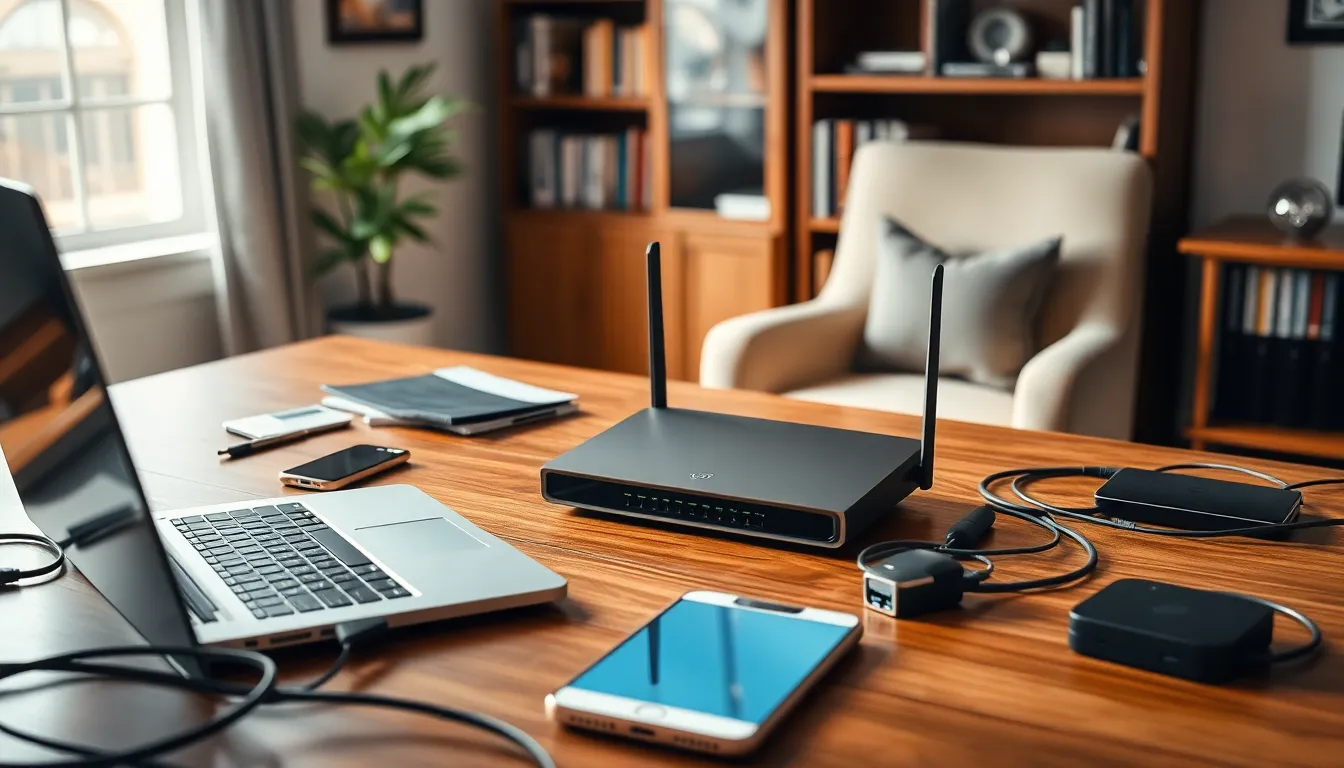In a world where everything’s connected, your router is the unsung hero of your digital life. It’s like the bouncer at a club, deciding who gets in and who gets the boot. But what happens when that bouncer decides to take a nap? Suddenly, all sorts of uninvited guests can crash the party, and your personal data is the main course.
Router security might sound as thrilling as watching paint dry, but neglecting it could lead to a data disaster. With hackers lurking around every virtual corner, it’s time to give your router the attention it deserves. After all, nobody wants their Wi-Fi to turn into a free-for-all buffet for cybercriminals. Let’s dive into the essentials of securing your router and keeping those pesky intruders at bay.
Table of Contents
ToggleUnderstanding Router Security
Router security plays a vital role in protecting network data and maintaining privacy. Various measures ensure that networks remain safe from unauthorized access and potential threats.
Importance of Router Security
Router security is crucial for preventing data breaches and unauthorized access. Cybercriminals often target vulnerable routers to exploit weaknesses in a network. A robust security setup mitigates risks linked with hacking and data theft. Effective protection ensures that devices connected to the router remain safe and secure. Implementing security protocols helps maintain the integrity of personal and sensitive information.
Common Threats to Router Security
Several threats jeopardize router security. Malware poses a significant risk by compromising the router’s functionality. Attackers may use techniques like phishing to gain access to sensitive information. Unauthorized users can exploit weaknesses in default settings and unsecured networks. Denial of service attacks disrupt regular internet access, affecting performance. These threats highlight the necessity for active and consistent router security measures.
Best Practices for Securing Your Router

Securing a router is essential for safeguarding personal data and maintaining privacy. Implementing effective practices can significantly reduce the risk of unauthorized access.
Change Default Passwords
Altering default passwords is vital for enhanced security. Many routers come with easily guessed usernames and passwords, making them prime targets for hackers. Users must create strong, unique passwords containing a mix of letters, numbers, and symbols. Regularly changing these passwords adds an extra layer of security, further protecting the network from potential breaches. When selecting a password, avoid using easily obtainable information, such as birthdays or names, to strengthen defenses against cyber threats.
Update Firmware Regularly
Keeping firmware up to date plays a crucial role in router security. Manufacturers release firmware updates to patch vulnerabilities and enhance functionality. Regularly checking for updates ensures that security measures remain effective against emerging threats. Users must enable automatic updates if available, as this feature ensures the router receives the latest patches without requiring manual intervention. An updated router firmware reduces risks associated with exploits and helps maintain network integrity.
Enable Network Encryption
Activating network encryption is critical for protecting data transmitted over the network. Utilizing encryption protocols like WPA3 provides robust security for connected devices. This practice safeguards sensitive information from eavesdroppers and unauthorized users. Configuring the router to encrypt traffic secures personal communications while using public Wi-Fi or other unsecured networks. It is essential to regularly review encryption settings to ensure they align with the latest security standards.
Additional Security Measures
Enhancing router security involves implementing various measures. Adding these extra layers of protection can significantly reduce vulnerabilities.
Set Up a Guest Network
Establishing a guest network keeps personal devices separate from visitors. This isolation protects sensitive information from potential threats posed by untrusted connections. Setting up a guest network is straightforward; most routers offer options in their settings. This network should use a distinct SSID and strong password, distinct from the primary network. Frequent password changes also add a layer of security. Ultimately, utilizing a guest network limits access for those who don’t require it, fortifying overall network safety.
Use a VPN for Enhanced Privacy
Utilizing a Virtual Private Network (VPN) offers improved privacy and security for internet traffic. A VPN encrypts data transmitted over the network, making it harder for cybercriminals to intercept sensitive information. Many reputable VPNs are available and provide user-friendly interfaces. Moreover, using a VPN disguises the user’s IP address, offering anonymity while browsing the internet. Adopting this measure becomes particularly important when using public Wi-Fi, where risks are heightened. Overall, a VPN is a valuable tool for enhancing router security and safeguarding personal data.
Router security is a vital aspect of maintaining a safe and reliable internet connection. By taking proactive steps to secure their routers, users can protect their personal data and devices from potential threats. Implementing strong passwords updating firmware and utilizing network encryption are essential practices that significantly enhance security.
As cyber threats continue to evolve staying informed and vigilant is crucial. Regularly reviewing and updating security measures ensures that networks remain resilient against unauthorized access. Ultimately a secure router is the first line of defense in today’s digital landscape.





